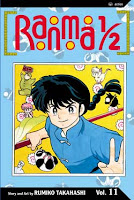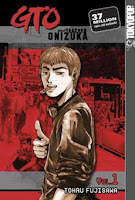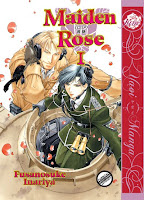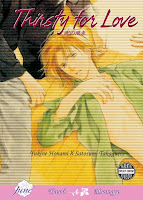My News and Reviews
Not much news (surprise!) other than I’m preparing to go on an extended vacation later this week. I’ve got posts ready to go while I’m away, and supposedly there will be web access where I’ll be, so there shouldn’t be too much interruption here at Experiments in Manga. (Fingers crossed.) In other news, last week I announced the winner of the Rurouni Kenshin manga giveaway. I also took the opportunity to make a couple of lists of samurai manga licensed in English, so if you’re looking for some to read, check it out. I also posted a review of the first volume of Anthony C. Yu’s translation of The Journey to the West. Since The Journey to the West is Chinese and not Japanese, I debated whether or not to include the review here. But because it’s such an influential work and there are so many references and adaptations of the story in Japanese literature I decided that I would go ahead. So there.
Quick Takes
 Ghost Talker’s Daydream, Volumes 1-3 written by Saki Okuse and illustrated by Sankichi Meguro. Overall, Ghost Talker’s Daydream feels very disjointed to me; it hasn’t quite managed to pull itself together yet within the first three volumes. The action sequences are often difficult to follow, which is particularly unfortunate as the fight scenes were some of my favorite parts. I also appreciated the S&M elements of the story although they are not incorporated into the work as a whole very well. Misaki does somewhat frustrate me as a character since she hates both her job as a dominatrix and as a necromancer but doesn’t seem willing to make an effort to change the status quo.
Ghost Talker’s Daydream, Volumes 1-3 written by Saki Okuse and illustrated by Sankichi Meguro. Overall, Ghost Talker’s Daydream feels very disjointed to me; it hasn’t quite managed to pull itself together yet within the first three volumes. The action sequences are often difficult to follow, which is particularly unfortunate as the fight scenes were some of my favorite parts. I also appreciated the S&M elements of the story although they are not incorporated into the work as a whole very well. Misaki does somewhat frustrate me as a character since she hates both her job as a dominatrix and as a necromancer but doesn’t seem willing to make an effort to change the status quo.
 Gin Tama, Volumes 6-14 by Hideaki Sorachi. I really do love this series. It’s ridiculous and absurd and genuinely funny if you’re into that sort of thing (which I am.) The cast of characters is huge and they all have their own distinct quirks and personalities. You will never confuse one with another. Despite recurring gimmicks, I haven’t yet gotten bored with Gin Tama. The diverse imaginings of Sorachi impress me greatly, especially considering that Gin Tama is a weekly serialization. Frequently it parodies other established series (and I know I’m missing some references) but it also parodies commonly used tropes. Sorachi doesn’t hesitate to break the fourth wall and I find his omake (which is usually text) to be hilarious.
Gin Tama, Volumes 6-14 by Hideaki Sorachi. I really do love this series. It’s ridiculous and absurd and genuinely funny if you’re into that sort of thing (which I am.) The cast of characters is huge and they all have their own distinct quirks and personalities. You will never confuse one with another. Despite recurring gimmicks, I haven’t yet gotten bored with Gin Tama. The diverse imaginings of Sorachi impress me greatly, especially considering that Gin Tama is a weekly serialization. Frequently it parodies other established series (and I know I’m missing some references) but it also parodies commonly used tropes. Sorachi doesn’t hesitate to break the fourth wall and I find his omake (which is usually text) to be hilarious.
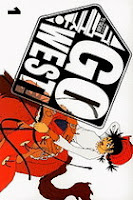 Go West!, Volumes 1-4 by Yu Yagami. Yagami has a talent for taking a tremendously silly concept, running with it, and making it work. In the case of Go West! we have Red Bullet—a horse that will only travel west in a straight line no matter what obstacles are in the way. Added to that is Naomi, a girl who has come to the West to search for her long lost parents. Pairing up, she and Red Bullet face many challenges together. Not the least of which is a bounty hunter and a wanted man who both claim to be related to her despite the complete lack of any evidence. Plus there’s plenty of gunfights, explosions, and general chaos and destruction that make Go West! highly entertaining. It’s goofy, but that’s not a bad thing.
Go West!, Volumes 1-4 by Yu Yagami. Yagami has a talent for taking a tremendously silly concept, running with it, and making it work. In the case of Go West! we have Red Bullet—a horse that will only travel west in a straight line no matter what obstacles are in the way. Added to that is Naomi, a girl who has come to the West to search for her long lost parents. Pairing up, she and Red Bullet face many challenges together. Not the least of which is a bounty hunter and a wanted man who both claim to be related to her despite the complete lack of any evidence. Plus there’s plenty of gunfights, explosions, and general chaos and destruction that make Go West! highly entertaining. It’s goofy, but that’s not a bad thing.
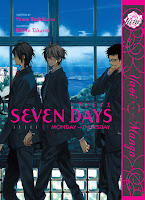 Seven Days: Monday-Thursday written by Venio Tachibana and illustrated by Rihito Takarai. Every Monday morning, Seryou agrees to go out with the first girl to ask him out. If he doesn’t develop any feelings for her by the end of the week, they break up. As a joke Shino, an older male schoolmate, asks Seryou out and is surprised when he says yes. Shino treats the whole thing like a game, buy Seryou is quite serious about it, especially when he discovers he actually likes Shino. The premise might sound irrational, but it actually works and makes sense in context. I was quite taken with the first volume of Seven Days and look forward to the second and final volume, Seven Days: Friday-Sunday.
Seven Days: Monday-Thursday written by Venio Tachibana and illustrated by Rihito Takarai. Every Monday morning, Seryou agrees to go out with the first girl to ask him out. If he doesn’t develop any feelings for her by the end of the week, they break up. As a joke Shino, an older male schoolmate, asks Seryou out and is surprised when he says yes. Shino treats the whole thing like a game, buy Seryou is quite serious about it, especially when he discovers he actually likes Shino. The premise might sound irrational, but it actually works and makes sense in context. I was quite taken with the first volume of Seven Days and look forward to the second and final volume, Seven Days: Friday-Sunday.
 Yo-yo Girl Cop directed by Kenta Fukasaku. Yo-yo Girl Cop is based on the manga Sukeban Deka by Shinji Wada (who sadly passed away just last week), making it the third live action film to be based on Wada’s series. A skilled and strong brawler, a teenager from New York is deported and recruited by a Japanese police organization to help track down a group of terrorists. Given the codename Asamiya Saki and a steel yo-yo as her only weapon, she heads undercover as a high school student. Yo-yo Girl Cop is a fun movie that doesn’t take itself too seriously. Asamiya is pretty badass and there are some fight sequences, especially towards the end, that make really nice use of the yo-yo.
Yo-yo Girl Cop directed by Kenta Fukasaku. Yo-yo Girl Cop is based on the manga Sukeban Deka by Shinji Wada (who sadly passed away just last week), making it the third live action film to be based on Wada’s series. A skilled and strong brawler, a teenager from New York is deported and recruited by a Japanese police organization to help track down a group of terrorists. Given the codename Asamiya Saki and a steel yo-yo as her only weapon, she heads undercover as a high school student. Yo-yo Girl Cop is a fun movie that doesn’t take itself too seriously. Asamiya is pretty badass and there are some fight sequences, especially towards the end, that make really nice use of the yo-yo.




